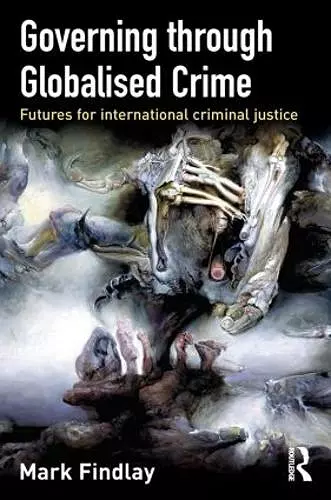Governing Through Globalised Crime
Futures for International Criminal Justice
Format:Paperback
Publisher:Taylor & Francis Ltd
Published:1st Apr '08
Currently unavailable, and unfortunately no date known when it will be back
This paperback is available in another edition too:
- Hardback£145.00(9781843923091)

This book examines the effects of crime globalization on international criminal justice governance. Governing Through Globalised Crime proposes a transformative approach to address these challenges.
The book Governing Through Globalised Crime provides a comprehensive analysis of how the globalization of crime affects the governance capacity of the international criminal justice system. It delves into the ways in which the increasing perception of global security risks has transformed the dynamics between crime and governance. This exploration emphasizes the need for a nuanced understanding of these relationships in a rapidly changing world.
In Governing Through Globalised Crime, the author argues that the fundamental values of freedom, equality, and personal integrity, which are often championed in the prosecution of crimes against humanity, should not be compromised in a world increasingly fixated on security and risk management. The book advocates for a rethinking of international criminal justice as a vital mechanism for global governance, suggesting that it can play a crucial role in addressing the challenges posed by global crime.
Furthermore, the text critiques the current state of international criminal justice, highlighting the need for it to reclaim its critical role in upholding constitutional legality. It examines case studies that reveal how the institutional governance of international criminal justice can sometimes serve politicized interests, undermining the legitimacy of its operations. As the book progresses, it brings to light the interests of victim communities and the limitations of international criminal justice within the prevailing risk/security framework, ultimately calling for a transformative approach to global governance in the context of crime.
'Criminology rarely produces work that offers a major reassessment of the scene and sets an agenda for innovative engagement with policy. Braithwaite's Crime Shame and Reintegration stands out in this way. This book by Mark Findlay is formed in the same mould and bears similar promise 'in relation to still more important issues. A major contribution by the leading criminologist of international justice.' −Professor Pat O'Malley, Sydney Law School, Australia
'The author combines three bodies of literature in a very creative way: crime in modern societies, economic and political globalisation, and the search for risk and security. In elaborating this triangle, Findlay's approach is innovative, fresh and thorough. The result is a must-read for every scholar, policy-maker and citizen dealing with or interested in crime, criminal justice and criminal policy.' −Stephan Parmentier, Catholic University of Leuven, Belgium'The war on terror, with its merger of the logics of crime control and international security has created an irreversible dynamic of change that threatens to transform the international legal order into a system of crime control. It has become impossible to think through the problem of crime governance within the sovereign state yet few scholars of crime understand the emerging global institutions of justice, and few international law experts take crime seriously as a problem of governance. Fortunately Mark Findlay's scholarship has long brought together both fields. In this remarkable study Findlay provides a compelling account of the rise of this new international form of crime governance, and a communitarian vision of justice that can compete with crime and risk in both international and domestic settings.' −Professor Jonathan Simon, Berkeley Center for Criminal Justice, University of California
ISBN: 9781843923084
Dimensions: unknown
Weight: 560g
300 pages